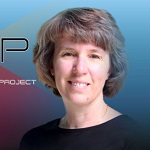Michela Taufer
SC19 Chair
Professor at University of Tennessee

Michela Taufer is an ACM Distinguished Scientist and holds the Jack Dongarra Professorship in High Performance Computing in the Department of Electrical Engineering and Computer Science at the University of Tennessee, Knoxville (UTK). She earned her undergraduate degrees in computer engineering from the University of Padova (Italy) and her doctoral degree in computer science from the Swiss Federal Institute of Technology or ETH (Switzerland). From 2003 to 2004, she was a La Jolla Interfaces in Science Training Program (LJIS) Postdoctoral Fellow at the University of California, San Diego (UCSD) and The Scripps Research Institute (TSRI), where she worked on interdisciplinary projects in computer systems and computational chemistry.
Michela has a long history of interdisciplinary work with scientists. Her research interests include software applications and their advance programmability in heterogeneous computing (i.e., multi-core platforms and GPUs); cloud computing and volunteer computing; and performance analysis, modeling and optimization of multi-scale applications. She has been serving as the principal investigator of several NSF collaborative projects. She also has significant experience in mentoring a diverse population of students on interdisciplinary research. Michela’s training expertise includes efforts to spread high- performance computing participation in undergraduate education and research as well as efforts to increase the interest and participation of diverse populations in interdisciplinary studies.
HPCwire: Hi Michela, congratulations on your selection as a 2019 HPCwire Person to Watch and, more importantly, as General Chair for SC19. Perhaps you could expand a bit on this year’s conference theme, HPC is Now.
Michela Taufer: It is amazing how HPC technologies are commonplace today, transforming our lives in countless ways. Just 30 years ago, they were simply big ideas, the futuristic HPC concepts that HPC researchers, scientists and engineers were just beginning to advance. SC was the place where those theories and hopes were shared and advanced.
SC is still a place to share new and futuristic ideas, but it isn’t just about the future anymore. It is about what is happening in the world of HPC today. Indeed, the scientists, engineers and researchers who built HPC tools and applications on the world’s fastest machines just a few years ago are seeing the tools they honed applied by others to solve the world’s greatest challenges. From precision farming to weather forecasting … medicine to meteorology … smartphones to ecommerce. HPC is making a difference across countless industries. At SC19, we will celebrate all of this; we will celebrate that HPC is Now.
HPCwire: The hype around AI writ large is deafening and often off-putting, yet it does seem as if an actual revolution in terms of combining deep learning and machine learning with traditional modeling & simulation is underway in HPC. What’s your sense of the promise and peril here? How do you see our approach to scientific computing changing and to what extent will you or do you now use these tools in your work?
Here’s how I view the promise of HPC — Scientific models representing phenomena in sciences are becoming more complex.
The solution’s search space for these models is becoming larger and larger. Deep learning and machine learning are transforming the search for these solutions by strategically narrowing down the search space, providing vital directions in the searched space, capturing patterns that our eyes cannot capture otherwise. HPC helps us deal, for example, with larger dimensions of parameters well beyond a 3D space.
Of course, there are perils, too —
We cannot blindly rely on deep learning and machine learning. While we scientists and engineers should drive the use of deep learning and machine learning, we must remember – and implore to others – that not everything can be resolved with those technologies. They aren’t panaceas. As we’re discovering daily, some deep learning and machine learning methods are more suitable than others.
Taking an open-eyed look at HPC’s benefits and drawbacks, I see scientific computing changing by tackling larger and larger scientific problems and answering scientific and engineering questions with a finer and finer grain of details. And of course, it will all be happening faster and faster.
In my group for example, we look at deep learning and machine learning as a vital support to converge data analytics and HPC. Deep learning is driving in situ analytics of molecular dynamics simulations to narrow down the search of rare events in molecules across hundreds of thousands of MD frames. And from ensembles of millions of MD jobs. Today, advanced machine learning techniques can transform coarse grained soil moisture values from satellite data (with a scale of 27km x 27km) to a fine grained scale of 1m x 1m, which is necessary for making precision agriculture happen.
HPCwire: Generally speaking, what trends and/or technologies in high-performance computing do you see as particularly relevant for the next five years? Also, what’s your take on near-term prospects for quantum computing and neuromorphic technologies?
I look forward to the evolution and success of two trends: the convergence of data analytics and HPC, and the further emergence of edge computing.
Regarding the first trend, data analytics and HPC will converge into a powerful domain for scientific discovery because they will be supported by heterogenous computing, deep learning and machine learning. I am a strong proponent of interdisciplinary research and I have high expectations in the outcome of this convergence.
As far as growth of edge computing, I belive more and more data will be generated at the “edge” or in the “fog.” As a result, computing and storage will have to move closer to the sources of the data. While this may be seen as a problem for commercial clouds and HPC centers, I instead view it as a truly exciting challenge for the HPC community that will gather at SC19.
HPCwire: Outside of the professional sphere, what can you tell us about yourself – personal life, family, background, hobbies, etc.? Is there anything about you your colleagues might be surprised to learn? (Your twitter account says you’re a pizza expert.)
I am a pizza lover. I could eat pizza for breakfast, lunch and dinner. I also love big gentle giant dogs. I have a fluffy Bernese mountain dog called Dante who is often confused for a small bear when my husband, Andre, and I go hiking in the Great Smoky Mountains in Tennessee. And I love Australian Aboriginal art. Every time I have the good fortune to visit Australia, I come home with a ‘small” piece.












































